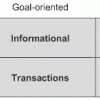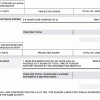Business Transformation Requires Transformational Leaders
Leadership and teaming skills are front and center in times of rapid change. Meet today’s constant disruption head on with expert guidance in leadership, business strategy, transformation, and innovation. Whether the disruption du jour is a digitally-driven upending of traditional business models, the pandemic-driven end to business as usual, or the change-driven challenge of staffing that meets your transformation plans—you’ll be prepared with cutting edge techniques and expert knowledge that enable strategic leadership.
Recently Published
At the heart of customer relationship management (CRM) is the customer, and knowing the customer is key. Next month you’ll learn why it's vital to determine not just the customer’s propensity to buy but her capacity to buy — and why companies whose CRM systems leverage broader market data and predictive analytics will surpass those that get their CRM functionality out of a box.
Business insights that reveal transformative opportunities are the holy grail of the 21st-century enterprise. To date, executives have discerned business intelligence through a combination of market research, consumer insights, and marketing analytics.
Whether based in fact or fiction, the anecdote about the grocer, the old woman, and her dog is legendary among CRM detractors. The woman -- we'll call her Mrs. Brown -- has been buying dog food at a national grocery chain for years. Suddenly, without warning, she stops.
While many companies have implemented CRM solutions to collect more behavioral data about their customers, savvier firms are beginning to realize that returning to the more qualitative and psychological roots of marketing science while attending to the full customer experience may lead to better success with CRM initiatives.
In the past 10 years, business-to-business (B2B) customer experiences have been more affected by changes deployed by IT functions than by changes in any other discipline (marketing, sales, accounting, finance, operations, etc.). Has IT responsibly delivered? This may seem like an odd question, since I just referred to the "customer experience." How did IT suddenly become accountable for this, too?
The linkage to customers is everywhere. Gaining insight by understanding customers and their behaviors and attitudes has emerged as one of the most fundamental of business strategies. The relevance of CRM to business processes, communication channels, and touchpoints (the Web, stores, service centers, call centers) is quite evident, and thus interest in CRM is gaining momentum.
Mobile Strategy: Benefiting from Mobile and Wireless Computing
The future ain't what it used to be.
-- Yogi Berra
ROI Analysis of Security Technology: Why Bother?
Attempting to quantify the economic value of security-related information technology is a lot like understanding the value of an insurance policy. Value stems less from what's delivered to the buyer and more from what costs and negative impacts the buyer avoids should a catastrophic event occur. Avoiding costs can be more powerful than saving or making money. The problem is that quantifying avoided costs is only truly possible after disaster strikes.







